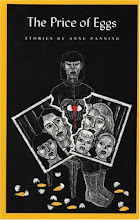
Every single time I go out running, I think of Joyce Carol Oates. I’m not sure if this is a good thing or a bad thing. I met her briefly when she came to Brockport as our visiting writer; she seemed grouchy and reticent to engage in any kind of small talk, but she did mention how many of her novels are composed in her head as she runs, and that she actually envisions scenes and then revises problematic scenes as she runs. "Ideally,” she writes, “the runner who's a writer is running through the land- and cityscapes of her fiction, like a ghost in a real setting.”
I head out, crossing first over the Erie Canal bridge, then zigzagging through a neighborhood of modest ranch houses before swinging past the public library and back up Main. I listen to my ipod; without it, I can’t run very far, if at all. The fact is in real life I don’t like listening to music very much and find even classical music grating. I have neither hip nor sophisticated musical taste: Meatloaf, Donna Summer, Ethel Merman, polka, Ricky Martin. I’m a little embarrassed to admit I’ll sometimes skip forward to hear Billy Joel’s “We Didn’t’ Start the Fire” when I really need motivation.
Unlike Oates, however, when I run I’m usually trying (desperately) to run away from my writing. I run in order to not think. “Little Machine, Little Machine,” I chant to myself in my head, which is the only way I can keep myself going. The fact is, it’s very difficult for me to run for several reasons: 1) I have a bad lower back, 2) I don’t like to sweat, 3) I hate the look and feel of athletic wear, 4) I hate to exercise in public, 5) I have a hard time shutting off my mind. But because I live so much inside my head, I have to make a concerted effort to remember that I have a body and to use it.
But there’s something that happens when I run: I get ideas. Yes, sometimes it’s an idea for a great new way to cook pork tenderloin. Or sometimes it’s an idea for a cool outfit I might put together the next day for teaching. But more often than not, it’s an idea for a story, an essay, an opening image. Most often it’s induced by the senses, and imbued with memory. I can’t, for example, run along the Erie Canal without thinking of my grandparents’ cabin on Lake Minnewawa and the way the sunlight twinkled off the waves, the way my grandpa would scale and filet sunfish in the backyard, dropping their tiny gray guts into an ice cream pail full of water, the way my sister and I drank root beer on the dock, read Seventeen magazine, slathered ourselves with Coppertone and had to keep moving, plank by plank, to follow the sun.
On weekends, when I run past college rentals with students playing beer pong in the yard, wearing bikini tops and shorts, holding up signs that say, “YOU HONK – WE DRINK,” I can’t help but think of those Friday afternoons in Minneapolis when we all threw money into the beer kitty for a case of Pfeiffer’s, played quarters at the dining room table for hours, then went screaming down the street to Blondie’s Bar where we danced on the table in our tie-dyed t-shirts.
“Little Machine,” I chant, “Little Machine.”
I could've never predicted I’d end up here in this tiny town on the Erie Canal, the great, gray glacial plains of Lake Ontario to the north, the deep black Elba onion fields to the south. Yet it’s been a fertile place for my imagination to grow. My novella, “Freeze,” is the first fictional piece that truly grew out of this region. You can’t drive past the Kodak tower for almost a decade and not have it worm its way in. You can’t run past tall, eerie Victorian houses and not imagine lives lived inside. You can’t walk over huge slate sidewalks, spun out of place by old gnarled tree roots, and not feel the power of history beneath them. My town is called a village—something I used to find very amusing and “quaint” when I first moved here twelve years ago. Now, I understand what that means.
“Little Machine,” I chant. “Little Machine.”
I run past my friends’ houses and wonder what they’re doing, if they’re happy, what they worry about at night before they fall asleep. I run past our babysitter’s house and hope she isn’t still suffering from insomnia. I run past Jill’s Antiques and think I should go buy those Pyrex bowls before someone else does. I run past the house that just burned and wonder what was lost—a pressed corsage? a valentine in a grandmother’s cursive? I run past my friend’s apartment complex and wonder if he’s on the treadmill or cooking salmon on his George Foreman grill.
When I reach home, I’m shot, utterly. But full, too, of freshly oxygenated thoughts.
“Running! If there's any activity happier, more exhilarating, more nourishing to the imagination, I can't think of what it might be. In running,” Oates writes, “the mind flees with the body, the mysterious efflorescence of language seems to pulse in the brain, in rhythm with our feet and the swinging of our arms.”



.jpg)